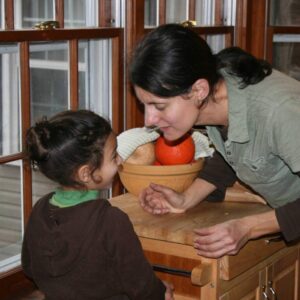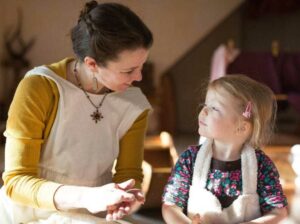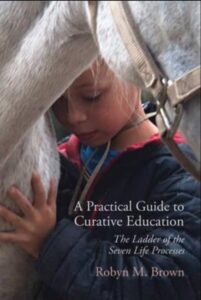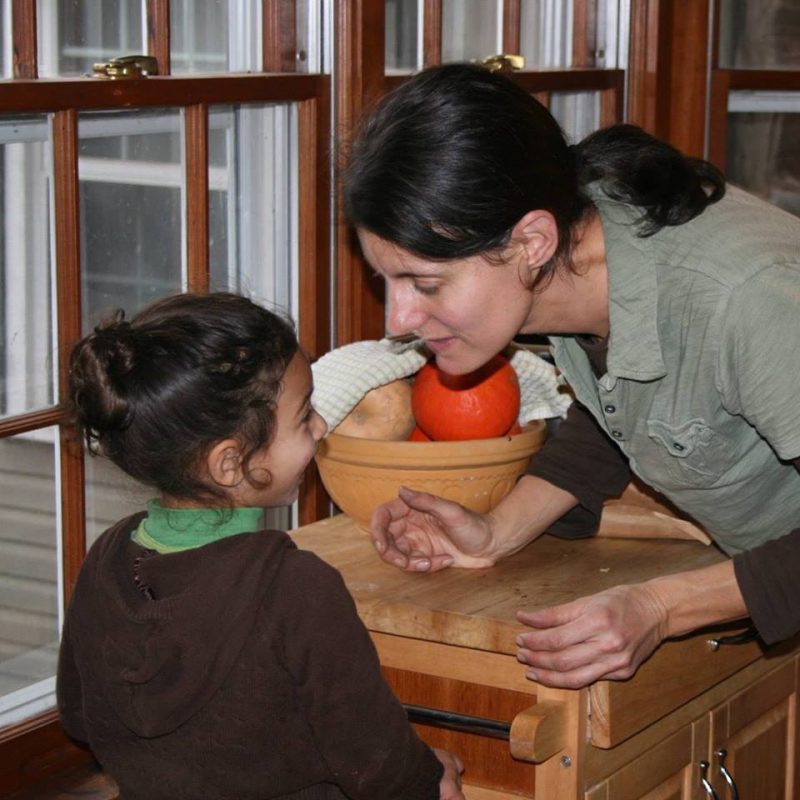February 26, 2023
This is the second of three follow-up articles to Kids Do Well if They Can that Mary O’Connell and I will write in the coming weeks. In this article, I offer a fundamental yet sometimes overlooked perspective on challenging behaviors that encourages and helps us get to the root of an issue at hand.

It has become quite clear in the creation of this series of articles that we are touching on a much needed dialogue among early childhood educators (and I mean both in schools and in home programs, we’re all educators in this realm). In my experiences as an educator and as a course facilitator with LifeWays, and in reading the recent experiences of veteran Waldorf educators in our field, we are all encountering children who are struggling with seemingly basic tasks of the day.
One facet of this concern that I have observed involves the larger context of our society that inevitably influences the daily work of even Waldorf and LifeWays educators.
We are steeped in a larger context of doing “all the things, all the time.” Mary points to this in her last article, “We can get so excited about all the wonderful things we have planned for the children in our care….” And it’s true! I’ve been guilty of the same mistake. Planning more than we can realistically follow-through with, all the while stretching the children thin.
Furthermore, high performance standards permeate our whole society; this is part of trying to do “all the things.” We may be expecting too much of ourselves, and thus expecting too much of the children. In our realm of education, we know that our stress directly impacts them. We must be constantly aware of what we are asking of ourselves and of the children, as well as what they are capable of “right now.” They may need us to scale back to the basics for a while.
The Foundational Senses: A Therapeutic Lens
Alongside remaining cognizant of our relationship to societal pressures, we have another valuable tool in examining common behavior challenges- the four foundational senses. One of our bedrock responsibilities in early childhood education is to strengthen the foundational senses, and much of our pedagogy elaborates on the ways we can do this. Nonetheless, not all parts are equal. There are still fundamental developmental capacities that need a degree of formation before the children are capable of fully participating in the others.
 When we use the foundational senses as a “lens” for viewing the child, we discover a true picture of the child and take the first steps towards offering a more healing education. If we direct our efforts towards fortifying these senses and, in turn, see that the children are able to carry through the day in a joyful and healthy manner, we know they are ready for something more.
When we use the foundational senses as a “lens” for viewing the child, we discover a true picture of the child and take the first steps towards offering a more healing education. If we direct our efforts towards fortifying these senses and, in turn, see that the children are able to carry through the day in a joyful and healthy manner, we know they are ready for something more.
In our last article, Mary offered three common patterns of challenging behavior that can indicate that a child has not yet fully formed some fundamental capacities for engaging in all the facets of our curriculum.
- Difficulty during transition times between one activity and the next.
- Falling apart while doing things that are challenging, such as getting ready to go outside or participating in circle time.
- Difficulty expressing needs in words, leading to frustration and, ultimately, outbursts that seem extreme.
If we notice that most of our day is spent managing these types of challenges, or other situations that we feel the children should be able to handle but are not, we need to take a step back to that therapeutic lens and restart from there.
Rudolf Steiner offered another tool for these situations that has been inadvertently overlooked and assumed to apply only to certain children- his curative education lectures. In book publication, these lectures were renamed Education for Special Needs. However, Steiner intended these lectures to be of service to all Waldorf school teachers, and they offer information that is applicable and relevant to all children– even in early childhood.
 Robyn Brown of the Mulberry Center for Curative Education, not only published a very important and accessible form of work with these lectures in her book, A Practical Guide to Curative Education, but also holds training for anyone who wishes to take up the work. If you would like to learn more about Steiner’s curative lectures or Robyn’s work, visit her website here. I have been engaged in her Curative Education training over the past year and a half, and it has transformed the way I view and meet the children in my care. These lectures are an answer to the question I have been holding for years of how to better support children in today’s rushing world.
Robyn Brown of the Mulberry Center for Curative Education, not only published a very important and accessible form of work with these lectures in her book, A Practical Guide to Curative Education, but also holds training for anyone who wishes to take up the work. If you would like to learn more about Steiner’s curative lectures or Robyn’s work, visit her website here. I have been engaged in her Curative Education training over the past year and a half, and it has transformed the way I view and meet the children in my care. These lectures are an answer to the question I have been holding for years of how to better support children in today’s rushing world.
Also, if you would like to reacquaint yourself with or delve more deeply into the foundational senses, LifeWays’ popular course, Building a Strong Foundation: Care of the Young Child’s Senses, would suit your needs. Keep an eye on our website for the next time we will offer the course!
Best wishes to navigating the challenging behaviors in your programs!

